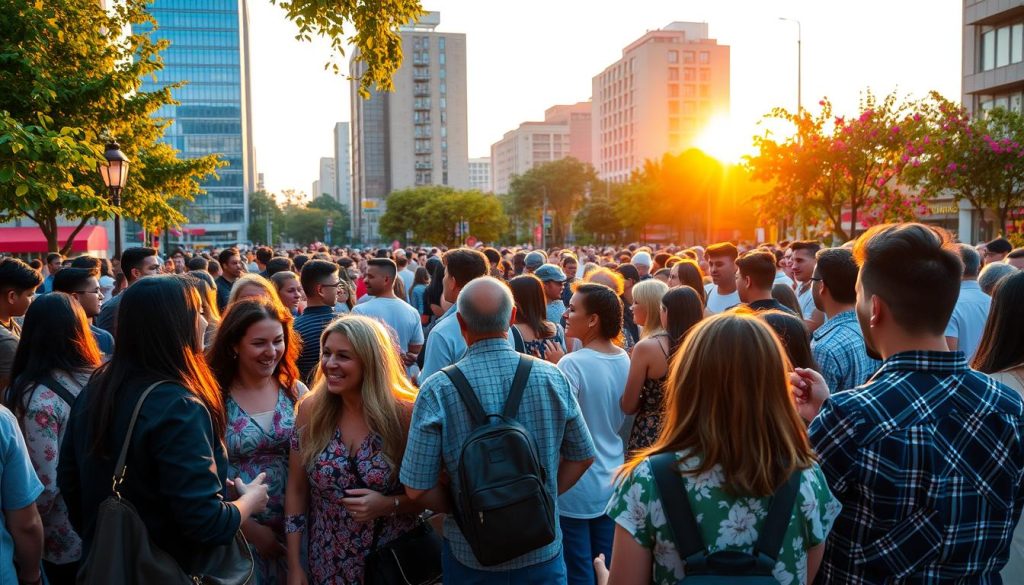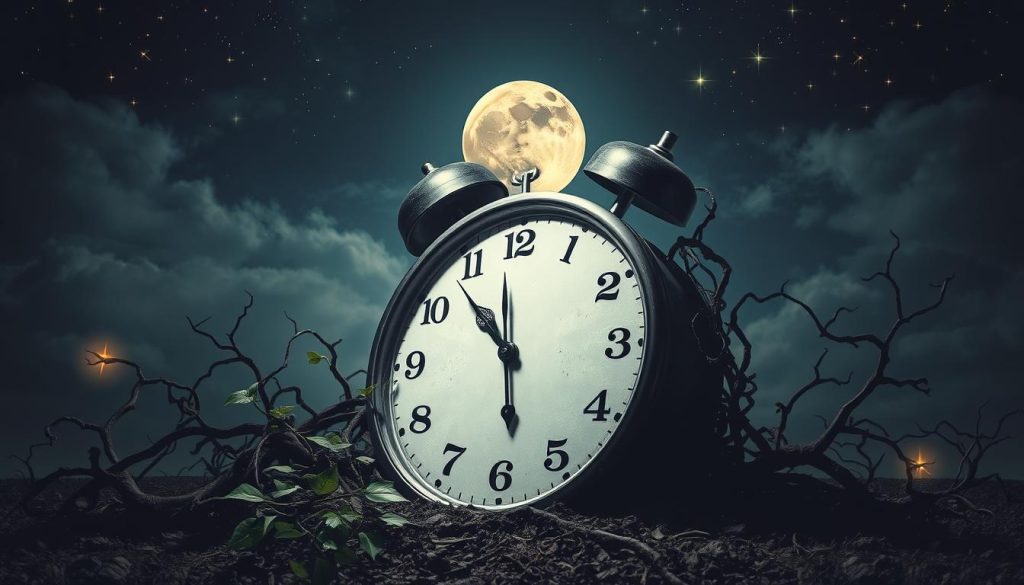Exploring my circadian rhythm shows how it’s linked to the social cues I face every day. Knowing my internal clock is key for staying productive and feeling good. It affects my energy, sleep, and how I connect with others.
By looking into this connection, I find ways to balance them. This balance boosts my productivity and happiness.
Understanding Circadian Rhythm
Circadian rhythm is key to managing my sleep and body functions. It’s about the 24-hour cycles that control hormone release, body temperature, and metabolism. This concept affects not just sleep but many daily functions.
What is Circadian Rhythm?
The term “circadian rhythm” comes from Latin, meaning “about a day.” It’s my internal clock that adjusts body functions based on the time. Light exposure is crucial for my internal clock, telling me when to wake up or sleep.
Keeping my sleep-wake cycle in sync with natural light-dark cycles is vital for my health.
The Science Behind Our Internal Clock
Our internal clock works through complex biochemical processes. Genes and proteins play a key role in keeping our rhythms in check. Research shows that disrupting these rhythms can harm our health.
Our performance and mood can reflect these changes. This highlights the need for a stable sleep-wake cycle.
| Factor | Effect on Circadian Rhythm |
|---|---|
| Light Exposure | Regulates sleep-wake cycle by stimulating the production of melatonin |
| Temperature | Affects bodily processes and sleep patterns |
| Hormonal Fluctuations | Influences various physiological activities over a 24-hour period |
| Meal Timing | Can alter the internal body clock and metabolic rates |
The Role of Social Cues in Daily Life
Social interactions greatly shape my daily life. The cues from those around me can change my plans. This includes meal times and sleep patterns. Understanding these cues helps me keep my life balanced.
How Social Interactions Influence Our Routine
Social cues guide my daily schedule. Invitations for dinner or outings can change my plans. This shows how social interactions affect my routines.
Research from the Journal of Social and Personal Relationships shows these connections impact my sleep and well-being. Being with others makes my life richer and shows how our behaviors are connected.
The Impact of Environment on Social Cues
The environment around me makes social cues stronger. Things like noise, lighting, and space design affect how I respond and interact. For example, a lively room can energize me, making it easier to stay active.
On the other hand, a loud or chaotic setting can make it hard to connect with others. By understanding these environmental factors, I can better manage my daily life. This helps me align my social interactions with the setting.

| Environmental Factor | Possible Influence on Social Cue | Effect on Daily Life Routine |
|---|---|---|
| Noise Levels | Distraction or Engagement | May delay or alter planned activities |
| Lighting | Energy Boost or Calmness | Affects my willingness to socialize |
| Space Design | Inviting or Confining | Influences the duration of interactions |
Circadian Rhythm and Social Cues
Understanding my biological clock and social schedules helps me manage my life better. This connection boosts my productivity and well-being. By studying how my internal clock meets social obligations, I make better daily plans.
Linking Biological Clocks to Social Schedules
Biological clocks are key to our daily lives and social interactions. When I do things that match my natural rhythms, I feel more alive and focused. But, when social plans mess with my clock, I get tired and moody. Knowing this helps me enjoy social events without hurting my health.
Real-Life Examples of Syncing Internal and External Clocks
There are many examples of how to match my circadian rhythm with social plans. Going to a friend’s evening party can be fun but might keep me up late. On the other hand, joining morning yoga classes fits my peak energy hours, making me feel great all day. These experiences show that aligning social plans with my biological clock improves my mood and productivity.
Effects of Disruption on Well-being
Understanding how our sleep patterns affect us is key. When our sleep gets irregular, we feel it in our mood and brain function. Studies show that bad sleep habits can make us more stressed and anxious.
These issues can make it hard to break the cycle of poor sleep and emotional problems.
Consequences of Disturbed Circadian Rhythm
A disrupted circadian rhythm can cause many health problems, including:
- Increased levels of stress and anxiety
- Impaired cognitive function, affecting focus and decision-making
- Physical health problems, such as obesity and cardiovascular diseases
It’s important to tackle these issues to live a balanced life. Knowing how disrupted sleep affects our mood and health helps us see the big picture.
Social Isolation and Its Impact on My Sleep Patterns
Social isolation is tough on our sleep. Being around friends and family keeps us emotionally stable. When we don’t see people, loneliness can set in.
Studies show that being alone can make sleep worse, leading to more emotional pain.
| Effects of Social Isolation | Impact on Sleep Patterns |
|---|---|
| Increased feelings of loneliness | Difficulty falling asleep |
| Reduced social support | Increased wakefulness during the night |
| Heightened anxiety levels | Lower overall sleep quality |

Knowing these effects motivates me to keep my social life and sleep healthy. This way, I can enjoy a more balanced life.
Strategies for Harmonizing Circadian Rhythm and Social Cues
Finding a balance between my circadian rhythm and social activities can be tough. Using effective strategies helps me create a daily routine that meets my sleep needs and social plans. Here are some tips to help you harmonize your schedule and enjoy social time.
Establishing a Routine that Works for Me
Creating a consistent daily routine is key for a healthy circadian rhythm. I focus on:
- Setting regular sleep and wake times to regulate my body clock.
- Keeping a sleep diary to monitor my patterns and adjust when necessary.
- Using planners to track social commitments and avoid overextension.
Tips for Integrating Social Activities with My Sleep Schedule
It’s important to participate in social activities, but they shouldn’t disrupt my sleep. Here are some strategies I find useful:
- Communicating my routine to friends and family, so they understand my scheduling needs.
- Choosing social activities that align with my preferred sleep hours.
- Planning ahead to avoid late-night engagements that could affect my rest.
The Importance of Light Exposure
Learning about light exposure is key to understanding circadian rhythms. Natural light helps control my internal clock, especially with melatonin production. Using light wisely can greatly improve my sleep-wake cycle.
How Natural Light Affects My Circadian Rhythm
Natural light tells my body when to wake up and when to sleep. Morning sunlight makes me alert and lowers melatonin, getting me ready for the day. Without enough morning light, my sleep can get out of sync. Starting the day with sunlight helps keep my rhythm healthy.
Strategies for Managing Light in Social Settings
It’s important to manage light in social situations to keep my rhythm in check. Here are some strategies I use:
- I plan social events during the day to get natural light.
- At night, I choose places with bright artificial light to feel like it’s daytime.
- I avoid screens before bed to prevent blue light from messing with my sleep.
These light management tips help me live a balanced life without disrupting my sleep.

Listening to My Body’s Signals
It’s important to listen to my body’s signals to keep life in balance. Knowing my sleep needs helps me plan my day for better health. My energy levels change due to diet, stress, and social life. Paying attention to these changes helps me meet my body’s needs.
Recognizing My Sleep Needs
Knowing when I’m tired or not helps me stay productive and happy. I track my sleep by keeping a journal. It shows me when I need more rest.
- Bedtime and wake-up time
- Quality of sleep
- Daytime energy levels
This helps me understand my sleep needs better. It also shows trends that affect my well-being. Knowing when to rest helps me make better choices, even when I’m invited out.
How to Respond to Social Signals and Personal Energy Levels
It’s a challenge to balance social life with sleep needs. Sometimes, I say no to plans that interfere with my rest. This approach helps my friends understand and support me.
- Politely explain my need for rest or prioritizing self-care.
- Suggest alternative times to meet that align better with my energy levels.
- Establish boundaries around late-night events that may disrupt my sleep routine.
By listening to my body, I take care of myself while still enjoying social life. Being open about my sleep needs helps me be my best self in all areas of life.
| Energy Levels | Time of Day | Recommended Activity |
|---|---|---|
| High | Morning | Exercise or productive work |
| Moderate | Afternoon | Creative tasks or socializing |
| Low | Evening | Relaxation or light activities |
The Future of Circadian Rhythm Studies
Exploring the future of circadian rhythm research is thrilling. New methods are making it easier to understand how these rhythms affect our lives. They show links to mental health, chronic illnesses, and how well we work.
These studies promise to reveal more about the impact of timing on our health. I’m excited to learn how to improve my wellness by matching my activities with my natural rhythms.
Technology is also playing a big role in monitoring our circadian rhythms. Wearable devices track light and sleep, helping us live in sync with our bodies. Soon, we’ll have more tools to blend our social lives with our natural rhythms, boosting our well-being.

